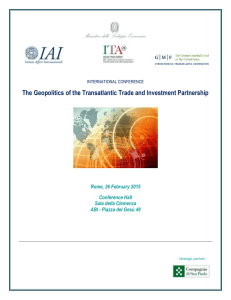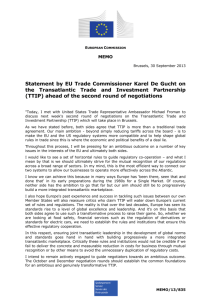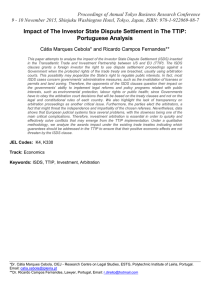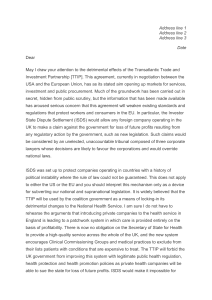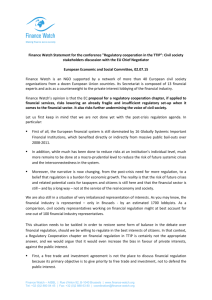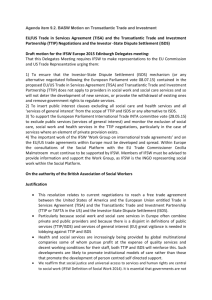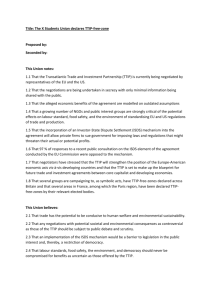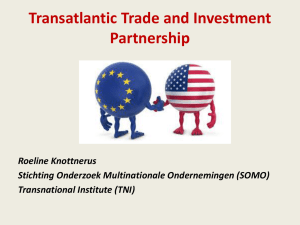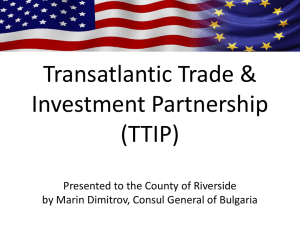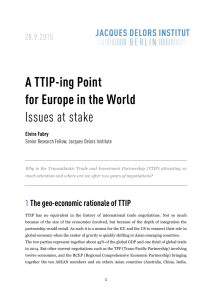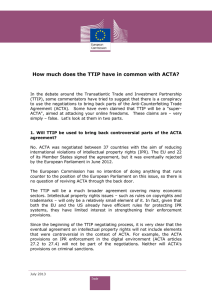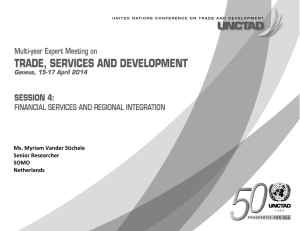A Race Down to the Lowest Common Denominator?
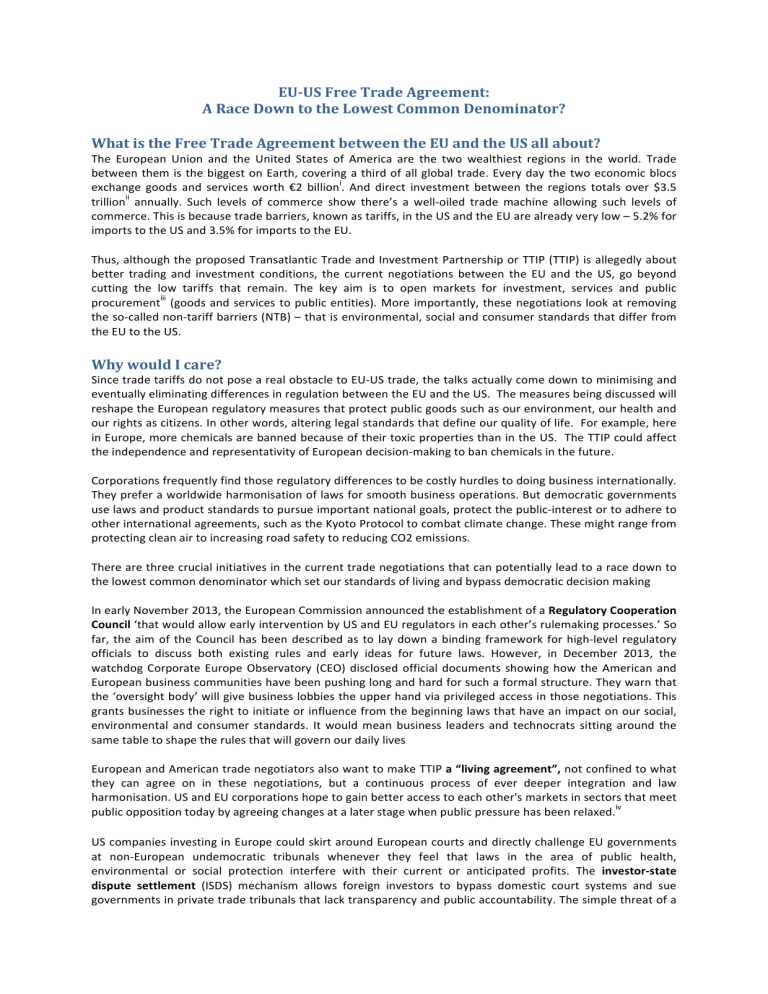
EU-US Free Trade Agreement:
A Race Down to the Lowest Common Denominator?
What is the Free Trade Agreement between the EU and the US all about?
The European Union and the United States of America are the two wealthiest regions in the world. Trade between them is the biggest on Earth, covering a third of all global trade. Every day the two economic blocs exchange goods and services worth €2 billion trillion i . And direct investment between the regions totals over $3.5 ii annually. Such levels of commerce show there’s a well-‐oiled trade machine allowing such levels of
commerce. This is because trade barriers, known as tariffs, in the US and the EU are already very low – 5.2% for imports to the US and 3.5% for imports to the EU.
Thus, although the proposed Transatlantic Trade and Investment Partnership or TTIP (TTIP) is allegedly about better trading and investment conditions, the current negotiations between the EU and the US, go beyond cutting the low tariffs that remain. The key aim is to open markets for investment, services and public procurement iii (goods and services to public entities). More importantly, these negotiations look at removing the so-‐called non-‐tariff barriers (NTB) – that is environmental, social and consumer standards that differ from the EU to the US.
Why would I care?
Since trade tariffs do not pose a real obstacle to EU-‐US trade, the talks actually come down to minimising and eventually eliminating differences in regulation between the EU and the US. The measures being discussed will reshape the European regulatory measures that protect public goods such as our environment, our health and our rights as citizens.
In other words, altering legal standards that define our quality of life. For example, here in Europe, more chemicals are banned because of their toxic properties than in the US. The TTIP could affect the independence and representativity of European decision-‐making to ban chemicals in the future.
Corporations frequently find those regulatory differences to be costly hurdles to doing business internationally.
They prefer a worldwide harmonisation of laws for smooth business operations. But democratic governments use laws and product standards to pursue important national goals, protect the public-‐interest or to adhere to
other international agreements, such as the Kyoto Protocol to combat climate change. These might range from protecting clean air to increasing road safety to reducing CO2 emissions.
There are three crucial initiatives in the current trade negotiations that can potentially lead to a race down to the lowest common denominator which set our standards of living and bypass democratic decision making
In early November 2013, the European Commission announced the establishment of a Regulatory Cooperation
Council ‘that would allow early intervention by US and EU regulators in each other’s rulemaking processes.’ So far, the aim of the Council has been described as to lay down a binding framework for high-‐level regulatory officials to discuss both existing rules and early ideas for future laws. However, in December 2013, the watchdog Corporate Europe Observatory (CEO) disclosed official documents showing how the American and
European business communities have been pushing long and hard for such a formal structure. They warn that the ‘oversight body’ will give business lobbies the upper hand via privileged access in those negotiations. This grants businesses the right to initiate or influence from the beginning laws that have an impact on our social, environmental and consumer standards. It would mean business leaders and technocrats sitting around the same table to shape the rules that will govern our daily lives
European and American trade negotiators also want to make TTIP a “living agreement”, not confined to what they can agree on in these negotiations, but a continuous process of ever deeper integration and law harmonisation. US and EU corporations hope to gain better access to each other's markets in sectors that meet public opposition today by agreeing changes at a later stage when public pressure has been relaxed.
iv
US companies investing in Europe could skirt around European courts and directly challenge EU governments at non-‐European undemocratic tribunals whenever they feel that laws in the area of public health, environmental or social protection interfere with their current or anticipated profits. The investor-‐state dispute settlement (ISDS) mechanism allows foreign investors to bypass domestic court systems and sue governments in private trade tribunals that lack transparency and public accountability. The simple threat of a
costly legal dispute would be sufficient to prevent governments from enacting legislation in the future.
v
Corporations all over the world have been using investor-‐state dispute settlement to challenge environmental, health, energy and other socially beneficial laws. By 2012, the total number of known treaty-‐based cases reached 514 against 95 governments, while compensation awards to corporations ranged from $2 million to
$1.8 billion vi . The most well-‐known case in the EU is the Vattenfall case. A Swedish energy firm with investments in German nuclear energy, Vattenfall, filed a request for arbitration against Germany which decided after extensive political consultations to phase out nuclear energy. The company is seeking $4.6 billion
USD in damages from the German government – German citizens – for future losses that may result from the nuclear phase-‐out.
vii
Supporters of the inclusion of ISDS in TTIP are promising an increase in foreign investment in the EU. It is important to note there is no evidence that countries which sign up to investor-‐state dispute settlement clauses receive more foreign direct investment as a result.
viii There is, however, significant evidence that such clauses threaten communities and the environment and, by offering greater privileges to foreign firms than to domestic ones.
ix
A number of key countries stand up to this gross miscarriage of justice and simply say ‘No’ to any free trade agreements that include an ISDS clause. The example was set by Australia refusing to include an investment chapter in the 2004 US-‐Australia free trade agreement. Other countries such as India, South Africa, Brazil,
Ecuador and Bolivia are all following suit and reviewing investment chapters included in free trade agreements.
x
Questions for European politicians wishing to be re-elected
When reflecting on all these elements, what emerges is an elite transatlantic project aimed at reversing many of the environmental and social gains that people have fought hard for and won over recent decades. It will be vital to ensure that leaders and governing institutions hear about our growing concerns and opposition to the proposed transatlantic trade agreement over the coming months –so that they reconsider their support for
TTIP and represent our interests. Please send these questions to your politicians at all levels of government,
and especially those in the European Parliament.
1.
What is your personal view on a transatlantic free trade agreement?
2.
Has your party discussed its position on TTIP?
3.
TTIP will give EU and US corporations the ability to sue governments over laws in areas of public health, environment or social protection that could interfere with their future profits – how will you work in the European Parliament to ensure that this undemocratic ‘investment chapter’ is excluded?
4.
Will you work to ensure Europe follows the lead of Australia, and says no to ISDS?
5.
The Regulatory Cooperation Council in TTIP threatens the democratic processes of the EU, as laid down in the Lisbon Treaty. How will you work to ensure that TTIP does not lead to any weakening of democracy?
6.
The Commission has promised time and again that TTIP ‘respects international environmental and labour agreements and standards, and promotes high levels of protection for the environment, workers and consumers’.
xi How will you work to ensure that the EU and Member States protect and promotethe high EU and US standards? Further, how will you ensure that the EU and member states can further develop new laws, within a democratic system, to ensure a sufficient level of protection for the environment and citizens?
i Patton Boggs. “The Transatlantic Trade and Investment Partnership: The Intersection of the Internet, Digital Commerce and Data-‐Privacy.” June 2013. http://www.pattonboggs.com/viewpoint/the-‐transatlantic-‐trade-‐and-‐ ii investment-‐partnership-‐the-‐intersection-‐of-‐the-‐internet-‐digital-‐commerce-‐and-‐data-‐privacy
Forbes. “A 2 nd term Policy for Obama That Will Boost The Economy, And Make Us Safer.” September 2013. http://www.forbes.com/sites/billfrenzel/2013/09/24/a-‐2nd-‐term-‐policy-‐for-‐obama-‐that-‐will-‐boost-‐the-‐economy-‐ and-‐make-‐us-‐safer/ iii European Commission. “European Union and United States to launch negotiations for a Transatlantic Trade and Investment Partnership.” Memorandum, February 13, 2013. Accessed on March 26, 2013: http://trade.ec.europa.eu/doclib/press/index.cfm?id=869 iv Corporate Europe Observatory (December 2013). Regulation – none of our business? v
http://corporateeurope.org/publications/regulation-‐none-‐our-‐business vi
Seattle to Brussels Network (October 2013). vii
United Nations Conference on Trade and Development (May 2013). “Recent Developments in Investor State Dispute Settlement”. http://unctad.org/en/PublicationsLibrary/webdiaepcb2013d3_en.pdf
viii
Sierra Club (2013). Open letter
See, for example, Working Group and Development and the Environment in the Americas. “Foreign Investment and Sustainable Development: Lessons from the Americas.” http://www.ase.tufts.edu/gdae/Pubs/rp/FDIWorkingGroupReportMay08_ES.pdf; Yackee, Jason Webb. “Do Bilateral Investment Treaties Promote Foreign Direct Investment? Some Hints from Alternative Evidence.” Virginia
Journal of International Law. Volume 51-‐Number 2-‐page 397. http://www.vjil.org/assets/pdfs/vol51/issue2/Yackee.pdf; Eisbett, Emma. “Bilateral Investment Treaties and Foreign Direct Investment: Correlation versus
Causation.”March 14, 2007. University of California at Berkeley. http://mpra.ub.uni-‐muenchen.de/2255/1/MPRA_paper_2255.pdf; Hallward-‐Driemeier, Mary. The World Bank Development Research Group. “Do Bilateral
Investment Treaties Attract Foreign Direct Investment?” ix Earthjustice, Friends of the Earth, IPS, Public Citizen, and the Sierra Club. “Investment rules in trade agreements: Top 10 changes to build a pro-‐labor, pro-‐community and pro-‐environment Trans-‐Pacific Partnership.” Policy
Brief, August 8, 2010. Accessed March 27, 2013: http://www.citizen.org/documents/InvestmentPacketFINAL.pdf. And Public Citizen. “Table of foreign investor-‐state cases and claims under NAFTA and other U.S. trade deals: x
March 2013.” Accessed on April 11, 2013: http://www.citizen.org/documents/investor-‐state-‐chart1.pdf
xi
The hankyoreh ‘India plans to abolish ISDS clause in FTAS’ April 6 th 2013
European Commission, DG Trade, (June 2014). Member States endorse EU-‐US trade and investment negotiations
http://trade.ec.europa.eu/doclib/press/index.cfm?id=918
